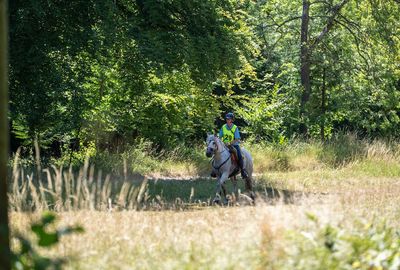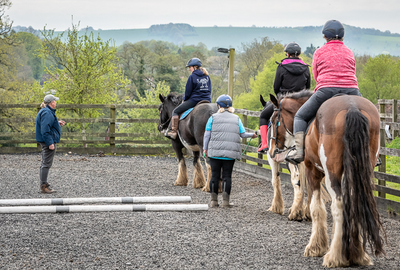Thank you for taking the time to find out more about the Safe to Play campaign.
Nothing is more important than the safety and wellbeing of everyone involved in our sport. The aim of the campaign is to ensure everyone keeps themselves and others safe from harm.
If you have a concern about a child, report a concern or contact safeguarding@bef.co.uk
SAY SOMETHING IF YOU SEE SOMETHING.
Your safeguarding questions
answered
What are the requirements to be an accredited coach?
All accredited coaches must hold an up-to-date criminal record check, and have safeguarding training.
British Equestrian and our member bodies would encourage anyone who wants to coach to become accredited. You can choose from three pathways:
British Horse Society (BHS) Equine Excellence pathway
Riding for the Disabled Association (RDA) Coaches pathway
Equestrian Coaching Certificate pathway
For more information please visit: Introduction to coaching - British Equestrian.
How do I check what the safeguarding policies and procedures are?
All BEF member bodies and their associated venues must have a Safeguarding Children Policy, a Safeguarding Adults at Risk Policy, and have a Safeguarding Officer who has been trained in safeguarding and had a criminal record check that has been approved by their Member Body.
You should know who your venue’s Safeguarding Officer is, and should have received a safeguarding induction at the venue you coach at. You should read the venue/ associated organisation safeguarding policies and discuss safeguarding expectations for coaches, participant and parents. For more information please visit: British Equestrian’s Safeguarding Policy (Children and Young People) .
Codes of conduct help individuals to understand their organisation’s expectations of them and provide a benchmark for identifying inappropriate behaviour. Read more about codes of conduct for coaches here: Running safe events - British Equestrian.
What is a criminal record check?
A Disclosure and Barring Service (DBS) check is a criminal record check. The DBS will check to see if a person has any criminal and/or police records and will include information about criminal convictions and cautions. They will also check to see if the person has been banned from working with children.
It is a criminal offence for employers or voluntary organisations to knowingly employ a barred person in regulated activity.
Once a check has been completed, the DBS will provide the person (not the employer) with a certificate called a 'disclosure'.
The Disclosure and Barring Service (DBS) Update Service allows:
applicants to keep their DBS certificates up to date
employers to check a DBS certificate
If a member of staff or volunteer is changing their role and will be taking on responsibility for children, they will need to have a criminal record check before they take up their new job role.
Each British Equestrian Member Body has a Criminal Record Check plan that is bespoke to their discipline. If in doubt, please contact your Member Body Safeguarding Officer or the British Equestrian Safeguarding team for advice.
For more information on DBS checks please see: Safeguarding for employers - British Equestrian.
How many children should I be supervising at one time as a coach?
Once you have all the correct safeguards in place, including a DBS check, you should use the below supervision ratios when coaching:
1:6 for participants 4-8 years old
1:8 for participants 9-10 years old
1:10 for participants 11-18 years old
Coaches must ensure children are supervised at all times during the session and around the venue, including if temporarily leaving a session (eg. for a toilet break). You should be clear to parents on your policy and processes for safeguarding, for example if a parent is late collecting their child.
For more information please see: Running safe events - British Equestrian
Your safeguarding questions answered
What should I be asking my venue or club?
Accredited venues and their coaches will have received safeguarding training and will have standards in place to help ensure a safe and inclusive environment for participants, staff and volunteers.
You can search online to find out whether your venue is accredited, or ask the venue or Member Body for more information. You can ask:
Is my child’s coach criminal record checked, safeguarding trained and qualified?
How can I get a copy of the club or venue’s safeguarding policy and procedures?
Who is the club/venue’s Safeguarding Officer for my child and how do I contact them?
What is the role of the Safeguarding Officer?
What should I do if I have a complaint?
If I have a concern about a child or someone’s behaviour towards a child, what should I do?
Do you have codes of conduct for the club/venue and where can I view them?
How will you keep in touch with me or my child?
How will you support my child’s medical and/or additional needs? (If appropriate)
How do I check what the safeguarding policies and procedures are?
All BEF member bodies and their associated venues must have a Safeguarding Children Policy, a Safeguarding Adults at Risk Policy, and have a Safeguarding Officer who has been trained in safeguarding and had a criminal record check that has been approved by their Member Body.
It is important to know who your Safeguarding Officer is because any concerns can be reported to them directly and they are trained to manage that information.
For venues who are not accredited, concerns need to be reported to the local authority.
For more information see: Running safe events - British Equestrian
How do I know if a coach has had the appropriate safeguarding checks and training?
Choosing a coach who's recognised, accredited or approved by a British Equestrian member body is a good way of ensuring they have the necessary qualifications and compliance in place, and that their coaching practice is of a high standard. All accredited coaches must hold an up-to-date criminal record check and be trained in safeguarding and first-aid.
Many of our member bodies have their own accreditation or approval scheme, so visit your discipline’s website or use the links below to find a coach who specialises in your chosen discipline:
horsescotland and British Horse Society also accredit coaches across all disciplines.
Find more information on choosing a coach here.
What should I be looking out for?
Some common signs that there may be something concerning happening in a child’s life include:
unexplained changes in behaviour or personality
becoming withdrawn
seeming anxious
becoming uncharacteristically aggressive
lacks social skills and has few friends, if any
poor bond or relationship with a parent
knowledge of adult issues inappropriate for their age
running away or going missing
always choosing to wear clothes which cover their body.
These signs don’t necessarily mean that a child is being abused, there could be other things happening in their life which are affecting their behaviour – but we can help you to assess the situation.
You may also notice some concerning behaviour from adults who you know have children in their care, which makes you concerned for the child/children’s safety and wellbeing.
Your safeguarding questions
answered
What is expected of our venue?
Safeguarding is the responsibility of everyone at the venue, not just the Safeguarding Officer. You need to:
Have an appointed Safeguarding Officer
Follow the British Equestrian Safeguarding Policies
Carry out a risk assessment to identify and manage risks at your club or venue. Template available here.
Utilise codes of conduct for your staff, volunteers, competitors, spectators and parents, available here.
Ensure that the Safeguarding Officer and other staff working with children, young people and adults at risk have attended safeguarding training workshops, and those working in regulated activity with children have had an appropriate criminal record check.
Ensure individuals at the club or venue know how to respond to concerns about a child. Examples could be a flowchart procedure for responding to concerns, or posters displayed outlining who the Safeguarding Officer at the club or venue is together with contact details.
Ensure a Safeguarding Policy summary statement is displayed at your venue, and make full copies available to anyone who cannot access the full policy online.
You risk de-registration from your Member Body if you fail to comply with their safeguarding standards. Conduct regular self-assessments. Contact your Member Body or see Running safe events - British Equestrian for more information.
What do I need to know about safer recruitment policies?
The safer recruitment policy and processes apply to everyone working with children or adults at risk (whether paid staff or volunteers). Have a clear safer recruitment policy and ensure you obtain the necessary criminal record (DBS) checks.
It is also vitally important to note the expiry date for any criminal record checks and accreditations for coaches at your venue. If these lapse, you would be failing in your duty of care as a venue. Coaches without accreditation may not be insured to teach under your insurance policy.
All members of the team should undertake a safeguarding induction so that they are aware of your policies, codes of conduct, and how to report any concerns.
For more information visit: Safeguarding for employers - British Equestrian
What training is available?
British Equestrian seeks to build a safe, enjoyable and inclusive environment for all, whether you're a rider, parent, official, volunteer, qualified coach or working with horses. We have developed safeguarding training that is equestrian-specific and child-centred.
There is a three-hour interactive ‘Safeguarding Equestrians Workshop’ as well as online courses available, being:
Equestrian Basic Safeguarding Awareness
Equestrian Advanced Safeguarding
Equestrian Advanced Safeguarding for Safeguarding Officers
We recommend that everyone working with under-18s renew their safeguarding education every three years.
For more information on training available please see: Safeguarding for employers - British Equestrian
What should I do if I have a concern?
If you have a concern about the welfare of a child, young person or adult at risk, or the behaviour of an adult towards a child, young person or adult at risk, you must report it as soon as possible.
Use the Report a concern form, or speak to the Safeguarding Officer at your venue, Member Body, or the BEF directly via safeguarding@bef.co.uk
For more information please see: Reporting a problem - British Equestrian











